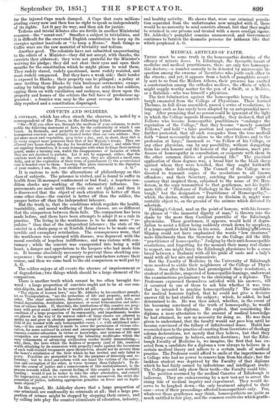CONVICTS AND SOLDLERS.
A emmusr, which has often struck the observer, is noted by a correspondent of the Times, in the following letter.
1‘ Sir—Will you allow me, through the medium of your columns, to make public the following statement of facts, for the authenticity of which I can vouch. In Bermuda, and probably in all our other penal settlements, the transported convicts are actually treated better than our own soldiers : they get more meat and vegetables, grog twice a day, and, in short, their diet is in every respect more generous than that of her Majesty's troops. They are allowed two hours during the day for breakfast and dinner ; and while they are regaling themselves, it is easy to imagine with what feelings their envious guard, under a burning sun, watch the disappearance of luxuries of -which they are not destined to partake. Let it not be supposed, either, that the convicts work for nothing : on the con rary, they are allowed a small sum daily, and at the expiration of their term of punishment (!) the accumulated sum is handed over to them. Leaving this plain statement to the digestion of your readers,-I am, Sir, your obedient servant, A. G.,'
It is curious to note the alternations of philanthropy on this class of subjects. The prisoner is visited, and is found to suffer in health from ill-managed confinement or bad food; a hopeless con- dition checks any working of the reformatory influence. Im-
provements are made these evils are set right ; and then it is discovered that the object of such attention is better off than some-other class—the convict is better off than the soldier, the pauper better off than-the independent labourer.
But the truth is, that the conditions which regulate the health, tractability, and moral wellbeing of these classes, are so different that the comparison between them fails. The comparison has-been made before, and there have been attempts to adopt it as a rule in practice. The living in the workhouse is to be made more " re- pulsive " than that of the independent labourer; • the state of the convict in a chain-gang or at Norfolk Island was to be made one of terrible and exemplary retribution. The consequences were, 'that the workhouse .was scourged with disease, was depraved with the moral scrofula of hopeless indifference, and was riotous with con- tumacy; while the convict was exasperated into being a wild beast, a danger and opprobrium to the keepers who had made him so. It became absolutely necessary to prevent these shocking con- sequences : the managers of paupers and malefactors retrace their course, and then we come back to the old comparison so well put by A. G.
The soldier enjoys at an events the absence of imprisonment or of degradation;' two things which should be a large element of the comparison.
There is another truth which cannot be too often brought for- ward : a large proportion of convicts ought not to be at our con- vict-depots, nor indeed to be convicts at all.
"The objects of human laws," says-Mr. Adderley in his excellent pamph- let on Transportation, "are the protection of life and property, and social order. The chief antecedents, therefore, of crime against such laws, are brutal degradation, destitution, ignorance; or social fermentation and infec- tion of vicious habit. IT, therefore, the institutions of-this country are.preg- nant with great social contrasts of wealth anctpoverty—if destitution Is the condition of a large proportion of its community, -and impediments beside*, arelplaced in the way of its natural relief—if large classes are allowed to spring up and grow in absolute ignorance, except of vice, and the-few laid hold of are treated with only homceopathic cures, z. e. with additional infec- tion,—if the cant of liberty is made to cover the permission of vicious edu- cation, far more national in extent and encouragement-than any contempo- raneous counter-education in virtue or knowledge and systems of life and occupation are countenanced among the labouring multitudes -which the very refinements of advancing civilization render doubly demoralizing,— why, then the laws which the holders of 'property (and of life, rendered worth attacking by its connexion with property) make against the incursions of such well-trained trespassers upon themselves, should not be severer than the boxer's retaliation of the blow which he has invited and only failed to parry. Penalties are pretended to be for the purposes of deterring and re- forming; but to deter and reform with one hand the victims of the seduc- tion and corruption of the other, is worse tyranny than Caligula's. To di- bate the oourse of justice and a consciousness of this maladjustment, is the process towards which the current feeling of this country is now morbidly, tending : would it not be better to take the other alternativ.e, and correct the impropriety, and so to render clear, firm and unreserved, the strict dis- pensation of justice, inflicting appropriate penalties on fewer and on legiti- mate objects ?"
In the sequel, Mr. Adderley shows that a large proportion of our criminals are-confessedly no criminals at all ; that a large pro- portion of crimes might be stopped by stopping their causes, and by- calling into play the counter-stimulants of education, industry, and healthy activity. He shows that, were our criminal popula- tion separated from the unfortunates now mingled with it, there would be no necessity to send convicts abroad, but that they might be retained in our prisons and treated with a more condign rigour. Mr. Adderley's pamphlet remains unanswered, and Government continues to furnish the dramatis personae for tableaux like that which-perplexed A. G.


























 Previous page
Previous page